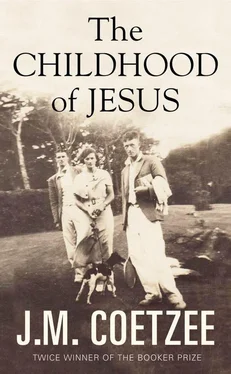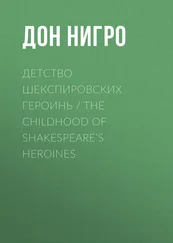‘No!’ The boy clutches the book tightly. ‘You are not going to take it! It’s my book!’
Since Inés took over, the apartment has lost its once austere air. It has, in fact, become cluttered, and not only with her many possessions. Worst is the corner by the boy’s bed, where a cardboard box overflows with objects he has collected and brought home: pebbles, pine cones, withered flowers, bones, shells, bits of crockery and old metal.
‘Isn’t it time to throw out that mess?’ he suggests.
‘It’s not a mess,’ says the boy. ‘It’s things I am saving.’
He gives the box a push with his foot. ‘It’s rubbish. You can’t save every last thing you come across.’
‘It’s my museum,’ says the boy.
‘A load of old rubbish is not a museum. Things need to have some value before they find a place in a museum.’
‘What is value?’
‘If things have value it means that people in general prize them, agree they are valuable. An old broken cup has no value. No one prizes it.’
‘I prize it. It’s my museum, not yours.’
He turns to Inés. ‘Does this have your blessing?’
‘Let him be. He says he feels sorry for old things.’
‘You can’t feel sorry for an old cup without a handle.’
The boy stares at him uncomprehendingly.
‘A cup has no feelings. If you threw it away it wouldn’t care. It wouldn’t be hurt. If you are going to feel sorry for an old cup, you may as well feel sorry for’ — he casts about in exasperation — ‘for the sky, the air, the earth beneath your feet. You might as well feel sorry for everything.’
The boy continues to stare.
‘Things are not meant to last for ever,’ he says. ‘Each thing has its natural term. That old cup had a good life; now it is time for it to retire and make way for a new cup.’
The stubborn look with which he is by now so familiar settles on the boy’s face. ‘No!’ he says. ‘I am going to keep it! I am not going to let you take it! It’s mine!’
As Inés gives way to him on every front, the boy grows more and more headstrong. Not a day passes without an argument, without raised voices and stamped feet.
He urges her to send him to school. ‘The apartment is becoming too small to hold him,’ he says. ‘He needs to face up to the real world. He needs wider horizons.’ But she continues to resist.
‘Where does money come from?’ asks the boy.
‘It depends on what kind of money you have in mind. Coins come from a place called the Mint.’
‘Is the Mint where you get your money?’
‘No, I get my money from the paymaster at the docks. You saw that.’
‘Why don’t you go to the Mint?’
‘Because the Mint won’t just give us money. We have to work for it. We have to earn it.’
‘Why?’
‘Because that is the way the world is. If we didn’t have to work for our money, if the Mint just handed money out to everyone, it would cease to have any value.’
He takes the boy to a football match, and pays at the turnstile.
‘Why do we have to pay?’ asks the boy. ‘We didn’t have to pay before.’
‘This is the championship game, the last game of the season. At the end of the game the winners get cake and wine. Someone has to collect money to buy the cake and the wine. Unless the baker gets money for his cake, he won’t be able to buy the flour and sugar and butter for the next cake. That’s the rule: if you want to eat cake then you have to pay for it. And the same goes for wine.’
‘Why?’
‘Why? The answer to all your Why? questions, past, present and future, is: Because that is the way the world is. The world was not made for our convenience, my young friend. It is up to us to fit in.’
The boy opens his mouth to reply. Swiftly he presses a finger to his lips. ‘No,’ he says. ‘No more questions. Be quiet and watch the football.’
After the game they return to the apartment. Inés is busy at the stove; a smell of scorched meat is in the air.
‘Supper time!’ she calls out. ‘Go and wash your hands!’
‘I’ll be off now,’ he says. ‘Goodbye, I’ll see you tomorrow.’
‘Do you have to go?’ says Inés. ‘Wouldn’t you like to stay and watch him have his supper?’
The table is set for one, for the little prince. From the frying pan Inés transfers two slim sausages to his plate. In an arc around them she sets the halves of a boiled potato, slices of carrot, and florets of cauliflower, over which she drips grease from the pan. Bolívar, who has been sleeping by the open window, rouses himself and pads over.
‘Mm, sausages!’ says the boy. ‘Sausages are the best food.’
‘I haven’t seen sausages in a long while,’ he remarks to Inés. ‘Where did you buy them?’
‘Diego got them. He is friendly with someone in the kitchen at La Residencia.’
The boy cuts his sausages into bits, cuts his potatoes, chews vigorously. He seems quite untroubled by the two adults standing over him, or by the dog resting his head on his knee, watching his every move.
‘Don’t forget your carrots,’ says Inés. ‘They make you see in the dark.’
‘Like a cat,’ says the boy.
‘Like a cat,’ says Inés.
The boy eats his carrots. ‘What is cauliflower good for?’ he asks.
‘Cauliflower is good for your health.’
‘Cauliflower is good for your health, and meat makes you strong, right?’
‘That’s right, meat makes you strong.’
‘I must go,’ he says to Inés. ‘Meat does make you strong, but maybe you should think twice before feeding him sausages.’
‘Why?’ says the boy. ‘Why should Inés think twice?’
‘Because of what they put in sausages. What goes into sausages is not always good for you.’
‘What do they put in sausages?’
‘Well, what do you think?’
‘Meat.’
‘Yes, but what kind of meat?’
‘Kangaroo meat.’
‘Now you are being silly.’
‘Elephant meat.’
‘They put pig meat in sausages, not always but sometimes, and pigs aren’t clean animals. They don’t eat grass, like sheep and cows. They eat anything they come across.’ He glances at Inés. She glares back, tight-lipped. ‘For instance, they eat poo.’
‘Out of the toilet?’
‘No, not out of the toilet. But if they happen to come across poo in a field, they will eat it. Without thinking twice. They are omnivorous, which means they eat anything. They even eat each other.’
‘That’s not true,’ says Inés.
‘Is there poo in sausages?’ says the boy. He has laid his fork down.
‘He is talking nonsense, don’t listen to him, there is no poo in your sausage.’
‘I am not saying there is actual poo in your sausage,’ he says. ‘But there is poo meat in it. Pigs are unclean animals. Pig meat is poo meat. But that is just my opinion. Not everyone will agree. You must decide for yourself.’
‘I don’t want any more,’ says the boy, pushing his plate aside. ‘Bolívar can have it.’
‘Finish your plate and I’ll give you a chocolate,’ says Inés.
‘No.’
‘I hope you feel proud of yourself,’ says Inés, turning on him.
‘It’s a matter of hygiene. Ethical hygiene. If you eat pig you become like a pig. In part. Not wholly, but in part. You partake of the pig.’
‘You are crazy,’ says Inés. She addresses the boy. ‘Don’t listen to him, he has gone crazy.’
‘I’m not crazy. It is called consubstantiation. Why else do you think there are cannibals? A cannibal is a person who takes consubstantiation seriously. If we eat another person we embody that person. That is what cannibals believe.’
Читать дальше












